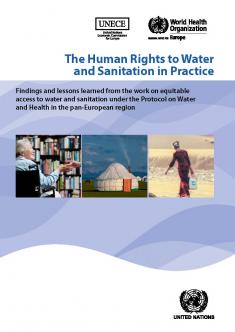Published:

The Protocol on Water and Health aims at achieving an adequate supply of safe drinking water and sanitation for everyone and effectively protecting water resources in the pan-European region. In pursuing such aims, it gives special consideration to ensure equitable access to water and sanitation services “for all members of the population, especially those who suffer a disadvantage or social exclusion”. It provides a sound framework for progressively translating into practice the human rights to water and sanitation, requiring its Parties to set targets and implement specific measures to ensure equitable access
This publication capitalizes on the findings and lessons learned from the work on equitable access to water and sanitation under the Protocol since 2011. It features the experiences of eleven countries from the pan-European region that have established baseline measures of their situation with regard to equitable access to water and sanitation. This was achieved through multi-stakeholders’ self-assessment processes by looking at geographical disparities, specific barriers faced by vulnerable and marginalized groups, affordability concerns, as well as the governance framework. The publication also presents the concrete technical and policy actions taken by these countries to achieve equitable access to water and sanitation. It examines national experiences with the development of Equitable Access Action Plans and considers the practical steps that can be taken to improve the planning and financing of specific action plans.
The publication aims to inspire further action to achieve equitable access to water and sanitation in the pan-European region. At national and local levels, it can encourage and support policy and decision makers, and other stakeholders to engage in self-assessments, which are instrumental in identifying specific actions to address gaps in access, to develop strategic approaches in financing equitable access, and to consecutively implement actions to achieve equitable access to water and sanitation for all members of the population.
ECE/MP.WH/17
Download the publication in English, French and Russian.
This publication capitalizes on the findings and lessons learned from the work on equitable access to water and sanitation under the Protocol since 2011. It features the experiences of eleven countries from the pan-European region that have established baseline measures of their situation with regard to equitable access to water and sanitation. This was achieved through multi-stakeholders’ self-assessment processes by looking at geographical disparities, specific barriers faced by vulnerable and marginalized groups, affordability concerns, as well as the governance framework. The publication also presents the concrete technical and policy actions taken by these countries to achieve equitable access to water and sanitation. It examines national experiences with the development of Equitable Access Action Plans and considers the practical steps that can be taken to improve the planning and financing of specific action plans.
The publication aims to inspire further action to achieve equitable access to water and sanitation in the pan-European region. At national and local levels, it can encourage and support policy and decision makers, and other stakeholders to engage in self-assessments, which are instrumental in identifying specific actions to address gaps in access, to develop strategic approaches in financing equitable access, and to consecutively implement actions to achieve equitable access to water and sanitation for all members of the population.
ECE/MP.WH/17
Download the publication in English, French and Russian.

